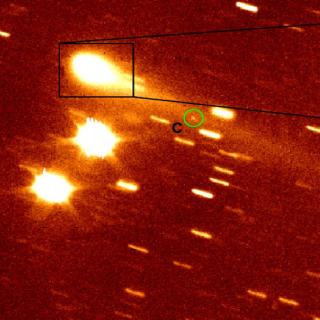Bibcode
Evangelista-Santana, M.; De Prá, M.; Carvano, J. M.; de la Fuente Marcos, C.; de la Fuente Marcos, R.; Alarcon, M. R.; Licandro, J.; Lazzaro, D.; Michimani, J.; Pereira, W.; Rondón, E.; Monteiro, F.; Arcoverde, P.; Corrêa, T.; Rodrigues, T.; Paganini-Martins, C.
Referencia bibliográfica
Monthly Notices of the Royal Astronomical Society
Fecha de publicación:
9
2023
Número de citas
4
Número de citas referidas
4
Descripción
We present an observational and numerical study of the borderline hyperbolic comet C/2021 O3 (PANSTARRS) performed during its recent passage through the inner Solar system. Our observations were carried out at OASI and SOAR between 2021 October and 2022 January, and reveal a low level of activity relative to which was measured for other long-period comets. In addition, we observed a decrease in brightness as the comet got closer to the Sun. Our photometric data, obtained as C/2021 O3 approached perihelion on 2022 April 21, show that the comet was much less active than what is usually expected in the cases of long-period comets, with Afρ values more in line with those of short-period comets (specifically, the Jupiter-family comets). On the other hand, the observed increase in the value of the spectral slope as the amount of dust in the coma decreased could indicate that the smaller dust particles were being dispersed from the coma by radiation pressure faster than they were injected by possible sublimation jets. The analysis of its orbital evolution suggests that C/2021 O3 could be a dynamically old comet, or perhaps a new one masquerading as a dynamically old comet, with a likely origin in the Solar system.
Proyectos relacionados

Pequeños Cuerpos del Sistema Solar
Este Proyecto estudia las propiedades físicas y composicionales de los llamados pequeños cuerpos del Sistema Solar, que incluyen asteroides, objetos helados y cometas. Entre los grupos de mayor interés destacan los objetos trans-neptunianos (TNOs), incluyendo los objetos más lejanos detectados hasta la fecha (Extreme-TNOs o ETNOs); los cometas, y
Julia de
León Cruz